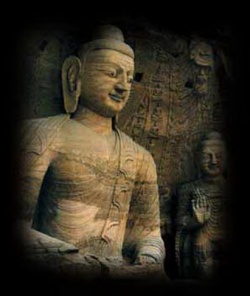Difference between revisions of "13 Shin Practices"
| Line 1: | Line 1: | ||
What We Practice? | What We Practice? | ||
[[File:Buddhas.jpg|thumb|250px|]] | [[File:Buddhas.jpg|thumb|250px|]] | ||
| − | |||
| − | |||
| − | |||
| − | |||
| − | 4. We practice…taking regular mindfulness communion during fellowship as a way to remember the interconnected relationship of all things and the one Life in boundless time and space. | + | |
| + | |||
| + | |||
| + | |||
| + | |||
| + | |||
| + | Here are 13 basic practices that our [[Buddhist Fellowship]] encourages its members and friends to engage in, in order to intimately [[experience]] the inner [[transformation]] from [[blind]] [[passions]] to [[enlightenment]]. The central daily practices include [[compassion]] for all [[sentient beings]], deep hearing, the voicing of the [[nembutsu]], [[chanting]], [[prayer]] and [[Going for Refuge]] and serving others in need. | ||
| + | |||
| + | 1. We practice…compassion as a natural [[manifestation]] of our [[faith]]. Our [[Buddha]] [[taught]], “Consider others as yourself.” True [[compassion]] is an engaged interconnection with the [[suffering]] and joys and all [[beings]]. | ||
| + | |||
| + | 2. We practice…deep hearing as a central [[religious practice]] because it is the best [[vehicle]] to engage the [[dharma]] and ultimately embody the [[nembutsu]]; it is characterized by continuous questioning, doubting, {{Wiki|reflecting}}, applying, reapplying, {{Wiki|forgetting}} and remembering the teachings. | ||
| + | |||
| + | 3. We practice…daily [[chanting]] as a [[vehicle]] to remind and [[awaken]] us to the [[Oneness]] of [[reality]] (one [[Life]]) and to [[water]] the [[blessings]] of the [[Buddha]] in our daily [[life]] and the [[world]]. | ||
| + | |||
| + | 4. We practice…taking regular [[mindfulness]] communion during fellowship as a way to remember the interconnected relationship of all things and the one [[Life]] in [[boundless]] [[time and space]]. | ||
[[File:Buddhism.jpg|thumb|250px|]] | [[File:Buddhism.jpg|thumb|250px|]] | ||
| − | 5. We practice…sitting meditation as a natural vehicle to calm the mind so we may deeply hear the transformative inner light; our goal is not to attain anything but just to naturally be as we are. | + | 5. We practice…sitting [[meditation]] as a natural [[vehicle]] to [[calm]] the [[mind]] so we may deeply hear the transformative [[inner light]]; our goal is not to attain anything but just to naturally be as we are. |
| − | 6. We practice…voicing the nembutsu as a living practice of mindfulness of Life’s grace (tariki) and most importantly, as a direct expression of the vibrant presence of the one Life in our hearts and minds. | + | 6. We practice…voicing the [[nembutsu]] as a living practice of [[mindfulness]] of Life’s grace ([[tariki]]) and most importantly, as a direct expression of the vibrant presence of the one [[Life]] in our hearts and [[minds]]. |
| − | 7. We practice…prayer is the best means to internalize our religious ideals, to express our deep gratitude to Amida, and to send and receive the blessings to the world. | + | 7. We practice…prayer is the best means to internalize our [[religious]] ideals, to express our deep [[gratitude]] to [[Amida]], and to send and receive the [[blessings]] to the [[world]]. |
| − | 8. We practice…simplicity as a means to strip away the evitable distractions of our modern 21st century life and open ourselves to the life’s essentials and vibrant beauty through the nembutsu. | + | 8. We practice…simplicity as a means to strip away the evitable {{Wiki|distractions}} of our {{Wiki|modern}} 21st century [[life]] and open ourselves to the life’s [[essentials]] and vibrant [[beauty]] through the [[nembutsu]]. |
| − | 9. We practice…Going for Refuge, in the Buddha, Dharma and Sangha, on a regular basis as a means to internalize the Buddhist teachings and remind us of our highest ideals. | + | 9. We practice…Going for [[Refuge]], in the [[Buddha]], [[Dharma]] and [[Sangha]], on a regular basis as a means to internalize the [[Buddhist teachings]] and remind us of our [[highest]] ideals. |
| − | 10. We practice…the Tenfold Precepts not as commandments but as an auxiliary deep hearing practice and as a natural result of Going for Refuge. Central to these ethical guidelines is the ideal of non-harming and they serve as a means to deeply study ourselves and help manifest our inner reality and the world into the Pure Land. | + | 10. We practice…the Tenfold [[Precepts]] not as commandments but as an auxiliary deep hearing practice and as a natural result of [[Going for Refuge]]. Central to these [[ethical]] guidelines is the {{Wiki|ideal}} of non-harming and they serve as a means to deeply study ourselves and help [[manifest]] our inner [[reality]] and the [[world]] into the [[Pure Land]]. |
| − | 11. We practice…going to fellowship on a regular basis to hear and re-engage ourselves with the teachings and have communion with other practiciers. Attending a gathering helps us remember to practice the dharma during our daily lives, and displays our inner commitment to total spiritual transformation. | + | 11. We practice…going to fellowship on a regular basis to hear and re-engage ourselves with the teachings and have communion with other practiciers. Attending a [[gathering]] helps us remember to practice the [[dharma]] during our daily [[lives]], and displays our inner commitment to total [[spiritual]] [[transformation]]. |
| − | 12. We practice…shojin, which is eating a vegetarian or vegan meal on the 16th of every month (Shinran’s Birthday) as a way to remember the sacrifices of living beings that sustain our life, thereby re-connecting in a real way to the dharma of compassion. If you are already a vegetarian, have raw food or fast for one day. | + | 12. We practice…shojin, which is eating a [[vegetarian]] or vegan meal on the 16th of every month ([[Shinran’s]] Birthday) as a way to remember the [[sacrifices]] of [[living beings]] that sustain our [[life]], thereby re-connecting in a real way to the [[dharma]] of [[compassion]]. If you are already a [[vegetarian]], have raw [[food]] or fast for one day. |
| − | 13. We practice…community service as the heartfelt response to human and nonhuman suffering (dukkha). Service also includes learning the Pure Land teachings for the sake off all beings, and sharing it with everyone as the universal way to alleviate affliction and distress. | + | 13. We practice…community service as the heartfelt response to [[human]] and [[nonhuman]] [[suffering]] ([[dukkha]]). Service also includes {{Wiki|learning}} the [[Pure Land teachings]] for the [[sake]] off all [[beings]], and sharing it with everyone as the [[universal]] way to alleviate [[affliction]] and {{Wiki|distress}}. |
{{R}} | {{R}} | ||
[http://buddhistfaith.tripod.com/beliefs/id3.html buddhistfaith.tripod.com] | [http://buddhistfaith.tripod.com/beliefs/id3.html buddhistfaith.tripod.com] | ||
[[Category:Buddhist Terms]] | [[Category:Buddhist Terms]] | ||
[[Category:Jōdo Shinshū]]{{BuddhismbyNumber}} | [[Category:Jōdo Shinshū]]{{BuddhismbyNumber}} | ||
Latest revision as of 12:16, 29 December 2023
What We Practice?
Here are 13 basic practices that our Buddhist Fellowship encourages its members and friends to engage in, in order to intimately experience the inner transformation from blind passions to enlightenment. The central daily practices include compassion for all sentient beings, deep hearing, the voicing of the nembutsu, chanting, prayer and Going for Refuge and serving others in need.
1. We practice…compassion as a natural manifestation of our faith. Our Buddha taught, “Consider others as yourself.” True compassion is an engaged interconnection with the suffering and joys and all beings.
2. We practice…deep hearing as a central religious practice because it is the best vehicle to engage the dharma and ultimately embody the nembutsu; it is characterized by continuous questioning, doubting, reflecting, applying, reapplying, forgetting and remembering the teachings.
3. We practice…daily chanting as a vehicle to remind and awaken us to the Oneness of reality (one Life) and to water the blessings of the Buddha in our daily life and the world.
4. We practice…taking regular mindfulness communion during fellowship as a way to remember the interconnected relationship of all things and the one Life in boundless time and space.
5. We practice…sitting meditation as a natural vehicle to calm the mind so we may deeply hear the transformative inner light; our goal is not to attain anything but just to naturally be as we are.
6. We practice…voicing the nembutsu as a living practice of mindfulness of Life’s grace (tariki) and most importantly, as a direct expression of the vibrant presence of the one Life in our hearts and minds.
7. We practice…prayer is the best means to internalize our religious ideals, to express our deep gratitude to Amida, and to send and receive the blessings to the world.
8. We practice…simplicity as a means to strip away the evitable distractions of our modern 21st century life and open ourselves to the life’s essentials and vibrant beauty through the nembutsu.
9. We practice…Going for Refuge, in the Buddha, Dharma and Sangha, on a regular basis as a means to internalize the Buddhist teachings and remind us of our highest ideals.
10. We practice…the Tenfold Precepts not as commandments but as an auxiliary deep hearing practice and as a natural result of Going for Refuge. Central to these ethical guidelines is the ideal of non-harming and they serve as a means to deeply study ourselves and help manifest our inner reality and the world into the Pure Land.
11. We practice…going to fellowship on a regular basis to hear and re-engage ourselves with the teachings and have communion with other practiciers. Attending a gathering helps us remember to practice the dharma during our daily lives, and displays our inner commitment to total spiritual transformation.
12. We practice…shojin, which is eating a vegetarian or vegan meal on the 16th of every month (Shinran’s Birthday) as a way to remember the sacrifices of living beings that sustain our life, thereby re-connecting in a real way to the dharma of compassion. If you are already a vegetarian, have raw food or fast for one day.
13. We practice…community service as the heartfelt response to human and nonhuman suffering (dukkha). Service also includes learning the Pure Land teachings for the sake off all beings, and sharing it with everyone as the universal way to alleviate affliction and distress.

